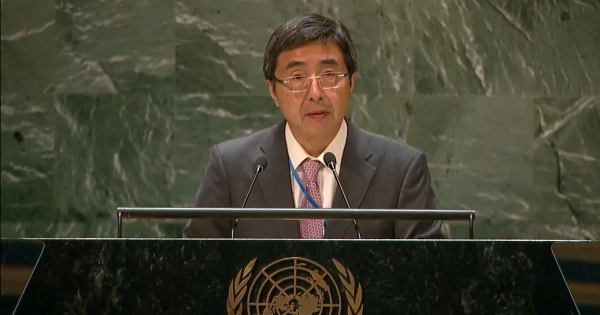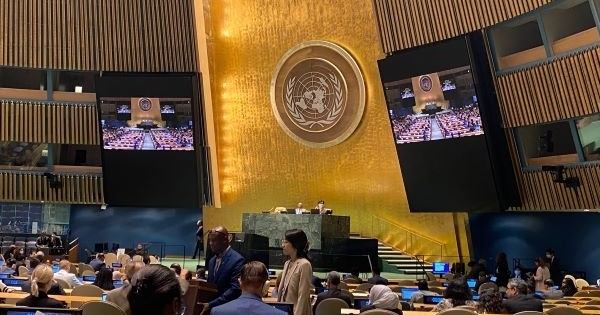平和構築委員会(PBC)報告書、平和構築と平和の持続及び平和構築基金(PBF)事務総長報告書に関する国連総会合同討論における石兼大使ステートメント
令和4年9月2日
 |
 |
Mr. President,
Thank you for convening this meeting. I wish to express my appreciation to the Chair and Vice-chairs of the Peacebuilding Commission, and the Peacebuilding Support Office for guiding and facilitating our discussion on the peacebuilding agenda.
At the outset, I would like to emphasize the importance of mobilizing our efforts on all three pillars of the UN - peace, humanitarian and development, for peacebuilding and sustain peace. The UN’s Peacebuilding Architecture, with the PBC at its core, should facilitate such efforts. With this in mind, I would like to share Japan's view on how to direct future efforts regarding the PBC and the PBF.
To begin with, I would like to discuss a few points about the PBC.
First, the PBC is a hub bridging all relevant UN bodies to ensure UN system-wide coherence and the triple nexus towards achieving the peacebuilding objectives. In this regard, the PBC's thematic meetings should be utilized to share knowledge and best practices among a wide range of stakeholders within and outside the UN system. Japan welcomes the increase of thematic meetings to 40% at the PBC last year. We believe that the key to sustaining peace is to build trustworthy institutions in areas related to the basic functions of the State.
Second, we should strengthen the PBC's advisory roles to the Security Council, the General Assembly, and other UN organs. We welcome the recent momentum to actively submit written advice from the PBC to the Security Council. As Japan becomes an elected-member of the Security Council from January next year, we will further contribute to strengthening the PBC’s advisory role as a member of both the Security Council and the PBC. .
Third, we should enhance the role of PBC as a platform to strengthen partnerships with various peace-building actors outside the UN system. We are encouraged by the steady increase in the number of non-UN briefers at the PBC since 2018. While the UN should continue to play a central role, we should also acknowledge the limits to what the UN alone can achieve.
Mr. President,
Please allow me to continue with the PBF.
The PBF’s comparative advantages vis-a-vis other funds are its ability to respond quickly and flexibly to peace-building needs on the ground. Such characteristic is indispensable in supporting cross-regional and transitional programs. We welcome the increase of the fund’s allocation to these programs.
Looking ahead, what can be done to strengthen the PBF, including its financing, while preserving its comparative advantages?
First, it is important to monitor and evaluate the results of PBF programs, visualize them, and publicize within and beyond the UN system, including to the IFIs, the UN Member States, and the general public. The efforts by the Secretariat to date, including the submission of evaluation reports and the launch of dashboards, have greatly contributed to achieving around 180 million dollars in voluntary contribution in 2021. For our part, Japan has been steadily implementing our commitment of $10 million to the PBF for 2020-24.
Second, we should strengthen the link between the work of PBF and the discussion in the PBC. Currently, the sole oversight body of the PBF is the PBF Advisory Group which reports to the Secretary-General. While some might argue the lack of inclusivity and transparency, the advisory group-format has been accepted on the basis that the PBF is funded by voluntary contributions. If we are to introduce a more formal process of reporting to and consultation with the Member States, for example, through the General Assembly, there is a high risk that the agility and flexibility of the PBF would be lost. In Japan’s view, the PBC has an important role to play in this regard. By increasing opportunities to share success stories and lessons learned from PBF-funded programs in the PBC, we should be able to increase the transparency of the PBF and still maintain its comparative advantages. The PBC would also benefit from such exercises.
In conclusion, I would like to reaffirm Japan’s full commitment to supporting UN’s agenda for building and sustaining peace.
Thank you.
